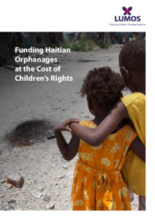Executive Summary
An estimated 30,000 children live in approximately 750 mostly privately-run and financed orphanages in Haiti. The Government of Haiti estimates that 80 percent of children in orphanages have at least one living parent, and almost all have other family members. Poverty, lack of access to basic services, and the desire to provide an education drive parents and caregivers to place their children in orphanages. With adequate support, many children could return to family- and community-based care, and at-risk families could be strengthened to prevent separation in the first instance. More than 80 years of research demonstrates the physical, social, and psychological harm caused by raising children in orphanages and that family-based solutions reduce risk of abuse and result in better outcomes for children.
To understand why orphanages continue to flourish in Haiti and how they affect children, Lumos investigated patterns in funding as well as the ramifications of orphanage life for children raised within their walls. Lumos documented financial support to just over one-third of known Haitian orphanages and found that at least US$70 million dollars was donated to them annually, predominantly from North American, Christian funders. This means that funding to the orphanage sector in Haiti is one of the most significant forms of any kind of international aid to Haiti, greater than most official development assistance to Haiti by donor countries. It also means that this is just the tip of the iceberg of financial and other forms of support to all the orphanages in the country. A conservative estimate of the total funding to all Haitian orphanages ranges upwards of $100 million per year.
This extraordinary investment does not necessarily translate to quality care and the best interest of children. In fact, what is being done in the name of care often comes at the high cost of the rights of children and their long-term prospects as independent, successful adults. Orphanages do not provide viable, long-term solutions for children. In the best-case scenarios, orphanage supporters do not understand the lifelong impact of orphanage care on child development, nor do they adequately prepare children to succeed once they leave care. In the worst cases, orphanages are rampant with human rights abuses. Only 15 percent of Haitian orphanages are officially registered with the government. At least 140 are believed to have extremely detrimental living conditions where children are at severe risk of violence, exploitation, abuse, neglect, and avoidable death.
This report is also available on our website in French; to read the French version of this report, please click here.

